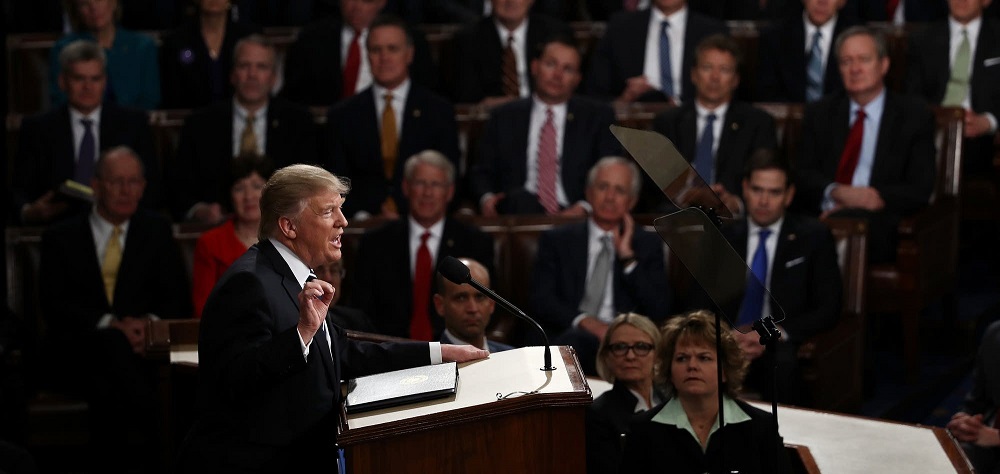Alwaght- Hundreds of American lawmakers led by senior members of the House and Senate foreign policy committees have written to President Trump on Monday calling on him to take “clear and sustained American action” in Syria to remove the threats posed by the terrorists and protect Washington’s allies and interests.
The bipartisan letter, signed by nearly 400 lawmakers, urged the president to send “a message of resolve to the malign actors in the region”.
Syrian crisis and division inside US administration
We can apparently claim that there is a severe clash of views among the US leaders on what approach can be taken towards the Syrian crisis, now in its ninth year. Last year, President Donald Trump in a surprise statement that obviously ignored the national security team decisions and the concerns of Washington’s regional allies, said that he planned to pull out the US forces from Syria as the ISIS was defeated in the war-ravaged Arab country. The decision did not go without repercussions inside the US. The Secretary of Defense James Mattis and Trump’s envoy to the US-led coalition in Syria Brett McGurk resigned as differences boiled over at the White House over Trump’s declaration. The announcement even sent the Republicans, who are led by Senator Graham Lindsey of South Carolina prominent for his support to Trump agenda, against the president and in favor of Mattis. As the heavy wave of objection headed to him, the president finally in February retreated from his decision, keeping only a small number of the total 2000 American troops on the Syrian soil.
The Congress lawmakers as well as the American allies in the region, most important of them the Israeli regime wonder, how Trump’s current policy can pursue the American interests in Syria by enabling him push for Iranian and Lebanese Hezbollah withdrawal from Syria, blocking the increasing Russian influence in the region, support the Kurdish allies against Turkey, influence the future Syrian political developments to provide a secure atmosphere for the pro-Western Syria opposition, and ultimately oust the government of President Bashar al-Assad.
Idlib operation and West’s concerns
The several-year highly costly fight of the Syrian government and its allies to obliterate terrorism and instability in the Arab country that led to the liberation of 90 percent of the terrorist-held territories now has reached a sensitive point as the Syrian military has launched an offensive to liberate the last major stronghold of the terrorists. Winning this battle will mean a definite win for Damascus and its backers’ camp.
The West, and mainly the US, strongly call for the anti-terror operation halt, all to save the status quo and prevent flee of the foreign terrorist fighters to their own countries in Europe and elsewhere and also to keep a pretext for intervention in the Syrian future. Since November 2018, the Damascus government showed a resolve to start an endgame offensive. But the assault was delayed as Russia opposed and Turkey urged a chance to persuade its loyal militias in Idlib to implement the already-agreed de-escalation deal.
But now that the operation is launched and Turkey showed obvious passiveness in the face of fast-moving Syrian advances, the US lawmakers, like their Western and Arab allies, observe the failure of all of their investment in a game of geopolitical influence in Syria.
So, one drive for the bipartisan call is the need to force-stop the Idlib recapture campaign and further support the Syrian Kurds who are highly likely to shift to the central government for protection against the Turkish threats.
Iranian-Russian cooperation
Part of the letter is dedicated to the so-called Iranian and Russian threats to the American influence and a call for protection of Washington’s regional allies. The major cause of the US representatives’ concern is the pressures put on them by the powerful pro-Israeli lobbies in the US and the Israeli regime which are growing increasingly worried about the Iranian sway in Syria.
Since Trump’s presidency started three years ago, the Israeli Prime Minister Benjamin Netanyahu has put massive energy into further embroiling the US in the Syrian developments, especially pushing Trump into a confrontation with the Axis of Resistance. The efforts have so far gone nowhere, to Netanyahu’s chagrin. Trump is optimistic to seal a deal with Moscow, which itself has considerations on the Israeli security, to end Iran’s advisory presence and Hezbollah’s military presence in Syria. But the Russians have repeatedly insisted that Iran’s presence in Syria is legitimate as it comes in response to the Syrian government’s official invitation to help the anti-terror combat.
Certainly, the Congress and part of the administration’s body have lost their trust in the viability of the Trump’s Syria military strategy and call for intensified intervention to face what they believe is a risk of more coordinated Moscow-Tehran alliance in Syria. The push will prompt the risk of direct military confrontation with these forces in Syria and on the other hand widens the gaps between Washington and Ankara, both members of NATO. Taking such a path, in Trump’s vision, will only make things worse for the US in Syria.



























